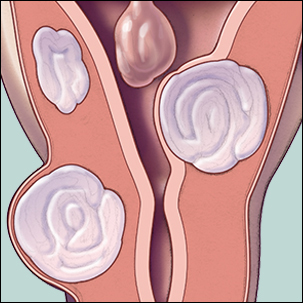For more than 60 years, Robert Kyle, M.D., has catalogued patient histories, archived blood samples and observed a vast number of people with plasma cell proliferative disorders. His methodical examination of the data allowed him to classify these disorders into groups:
- Benign — monoclonal gammopathy of undetermined significance
- Intermediate — smoldering multiple myeloma
- Severe — multiple myeloma
This groundbreaking work has changed the practice of medicine.
Because of Dr. Kyle, today's patients have a much clearer idea of whether or not their condition will progress to myeloma and, if so, at what stage in their life they can expect to develop symptoms. Today's specialists understand that the benign and intermediate forms are best carefully monitored but left untreated to avoid the potentially debilitating side effects of therapy. In many cases, people do not develop symptoms until very late in life or die of unrelated reasons before the disorder causes problems.
Dr. Kyle also launched the dysproteinemia group at Mayo Clinic, which is now the strongest and largest such team in the world. The group includes 12 physicians who specialize exclusively in these disorders. Their research and clinical advances have led to substantial prolongations in the life expectancies of their patients. At a sprightly 83, the founding member continues his research, adding to the numerous associated conditions and syndromes that he has already identified.
Monoclonal gammopathy of undetermined significance
 Dr. Kyle in the lab with longtime collaborator David Loegering.
Dr. Kyle in the lab with longtime collaborator David Loegering.
In 1978, Dr. Kyle described monoclonal gammopathy of undetermined significance (MGUS). Monoclonal refers to proteins produced from one clone of plasma cells in the bone marrow. A gammopathy is a disorder in the production of proteins (antibodies), in this case M (monoclonal) proteins. The undetermined significance means that there is no way to tell which cases will progress to multiple myeloma or another dysproteinemia, such Waldenstrom's macroglobulinemia, primary amyloidosis, B-cell lymphoma or chronic lymphocytic leukemia.
Before Dr. Kyle's discovery, the condition was called benign monoclonal gammopathy, and no follow-up was recommended. It was as early as 1964 when Dr. Kyle's interest was piqued: He learned that a person developed multiple myeloma 19 years after first being diagnosed with benign monoclonal gammopathy. When they published the case, he and a colleague included a warning to physicians that it was not safe to assume the condition was benign.
While this case illustrated the importance of closely monitoring people diagnosed with MGUS, another case convinced him that people benefited by not being subjected to drastic treatments. Clearly, some parameters were needed, and Dr. Kyle was on it. In the 1960s, he:
- Began epidemiological studies
- Established the Special Protein Laboratory
- Began freezing serum samples
- Founded Mayo Clinic's Myeloma, Amyloidosis and Dysproteinemia Clinic
- Began collecting and recording data on all people with monoclonal plasma cell disorders
Multiple myeloma is a cancer of the plasma cells. People with the condition have an increase of abnormal plasma cells (myeloma cells) in their bone marrow, monoclonal protein in their blood and, often, osteolytic bone lesions. As the disease progresses, symptoms of anemia, fatigue, weakness, fractures, bone pain, increased blood calcium, kidney problems, recurrent infections and bleeding are common. The median survival rate is three to four years. The American Cancer Society estimates 20,000 people are diagnosed with multiple myeloma in the U.S. each year.
People with MGUS do not have symptoms associated with multiple myeloma. The disorder is diagnosed by laboratory tests that indicate an increase in M proteins in the blood and elevated bone marrow plasma cells.
"I recognized the importance of a having a laboratory that could identify the type of protein and be able to distinguish monoclonal from polyclonal proteins," says Dr. Kyle. "I visited the National Institutes of Health and Columbia University to learn immunoelectrophoresis and lobbied hard for the lab. Once established, I spent my Saturday mornings reviewing every electrophoretic pattern that came through the clinic. I would usually pick up eight or 10, which both improved the quality of patient evaluation and helped with my research." For many years, Dr. Kyle was the only person in the country running a special protein laboratory as well as seeing patients.
"The beautiful thing about having the lab and being a clinician was that when I found a monoclonal protein, I could call the patient's physician and ask about the clinical presentation," says Dr. Kyle. "Sometimes they had not considered myeloma."
The next step was to establish the Myeloma, Amyloidosis and Dysproteinemia Clinic.
"At that time we all saw mostly general medicine patients and only a small percentage within our specialties. That called for many floor consultations to get expert opinions outside our specialties," explains Dr. Kyle. "So most were very happy for me to see their patients. That's how I built up my practice."
It worked the other way, too. If Dr. Kyle's clinical examination led him to suspect a plasma cell disorder, he would go back to the lab and hunt down those M proteins. The Myeloma, Amyloidosis and Dysproteinemia Clinic grew in depth and stature and continues to be a leader in the treatment of myeloma and related disorders.
When Dr. Kyle began collecting data, IBM punch cards were the mode of storage. Today, scientists can access a computerized database with details of the 42,000 people with monoclonal plasma cell proliferative disorders seen at Mayo. Together with 250,000 frozen serum samples, Mayo has assembled an important resource with which to advance the science.
In 1974, the National Institutes of Health awarded Dr. Kyle and his colleagues a program project grant to study monoclonal gammopathies. The grant consisted of several closely related projects conducted by collaborating investigators. Dr. Kyle discovered MGUS by fastidiously examining clinical and laboratory records back to the 1960s. It turned out to be a very common condition. Three to 4 percent of the population age 50 or older has MGUS (N Engl J Med. 2006). The program project has had continuous funding ever since. Dr. Kyle was its principal investigator until a decade ago, and he remains a co-investigator on three projects.
Smoldering multiple myeloma
 Dr. Kyle on a lecture trip in France.
Dr. Kyle on a lecture trip in France.
Smoldering multiple myeloma (SMM) was first described by Dr. Kyle and his protege, Philip R. Greipp, M.D. (N Engl J Med. 1980). Drs. Kyle and Greipp observed six patients whose lab tests would prompt a diagnosis of multiple myeloma. However, they had no symptoms. Moreover, with no treatment, they remained stable for five or more years. The researchers decided to differentiate this group by calling their disorder "smoldering multiple myeloma."
In 2007, Dr. Kyle published a study with S. Vincent Rajkumar, M.D., and colleagues (Br J Haematol.) in which they reviewed the medical records of 276 people with SMM over 26 years. This revealed that the risk of progression from SMM to multiple myeloma is related to the proportion of bone marrow plasma cells and the M protein level in the blood when the patient is diagnosed. From the data, Angela Dispenzieri, M.D., created a risk-stratification model with three distinct prognostic groups (Blood 2008). The risk of progression to malignancy is substantially different between MGUS (1 percent per year) and SMM (10 percent per year).
Habits and hobbies
 The "phamous" philatelic.
The "phamous" philatelic.
A long career of 80-hour workweeks has shaped habits that Dr. Kyle finds hard to shake. The octogenarian incorporates informal exercise into his day so as not to interfere with his research time. Every weekday morning, he makes the 10-minute walk to work, climbs the stairs to the sixth floor and arrives in his office by 7:30. At noon, he walks back to lunch with his wife, then back to the office where he works until 5 p.m. He also works in his office on Saturday mornings — when he's in town.
Apparently immune to jet lag, he logs about 150,000 miles a year serving on a variety of professional boards and lecturing around the world. He is chairman of the Scientific Advisory Board of the International Myeloma Foundation and director of the Scientific Advisory Committee of the International Waldenstrom's Macroglobulinemia Foundation; he also serves on the Boards of Directors of both foundations.
Dr. Kyle's vitality is underscored by his foray into stamp collecting in 1965. When back pain confined him in hospital for 40 days, he seized the opportunity to page through volumes of stamp catalogs looking for any that commemorated blood transfusion or cancer. What began as an interest turned into a lifelong hobby of collecting, exhibiting and writing about stamps that earned him the Myrtle Watt Award for Medical Philately Journalism in 1980 and the Distinguished Topical Philatelist award from the American Topical Association in 1982.
For decades, he has written historical vignettes about stamps associated with medicine. They were routinely published in the Journal of the American Medical Association and subsequently in Mayo Clinic Proceedings and bound into three volumes called Medicine and Stamps.
Half a century at Mayo Clinic
 1953 Mayo staff photo of Dr. Kyle.
1953 Mayo staff photo of Dr. Kyle.
This year, Dr. Kyle celebrates his 50th year at Mayo Clinic. The list of successful hematologists who he trained numbers more than 200. He stopped seeing patients in 1999 at the age of 71, but continued running the Special Protein Laboratory for the next five years. Since age 76, he has focused entirely on research. A volume could be made of his list of scientific publications, which include more than 2,000 papers and abstracts.
Of his many honors, he is most proud of having received the David A. Karnofsky Memorial Award from the American Society of Clinical Oncology and the Wallace H. Coulter Award from the American Society of Hematology. They are the highest honors bestowed by these two groups, and he is the only person to receive both. The International Myeloma Foundation has also established the Robert A. Kyle Lifetime Achievement Award to "honor the physician who most exemplifies a singular dedication to and compassion for myeloma patients and treatment of their disease."
Dr. Kyle has truly gained world recognition as a respected leader in his field for all three of Mayo's interlocking shields — Mayo's logo symbolizes the importance of combining research and education to enable clinicians to offer the best treatments to patients.
And he is not done. Dr. Kyle is currently working on two projects. One is investigating the natural course of idiopathic Bence Jones proteinuria, another protein disorder that he and Dr. Greipp described in 1982 (N Engl J Med.). The other is on an entity called smoldering Waldenstrom's macroglobulinemia.
Dr. Kyle still gets lots of emails and calls from patients and physicians seeking his expertise; he responds to all of them and visits with many when they come to the clinic. Dr. Kyle's entire career has been directed at helping people with myeloma and related disorders, and he has an astute memory for patients' names and their stories and absolutely lights up when he tells them.
"Patients are remarkable and having contact with them is very rewarding," he says. No doubt both his patients and his colleagues would say exactly the same thing about Dr. Kyle.







